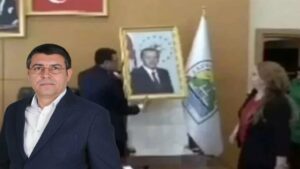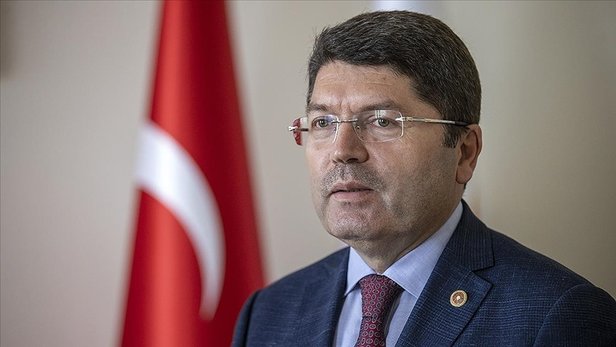Turkish Justice Minister Yılmaz Tunç has criticized the removal of a portrait of President Recep Tayyip Erdoğan from a municipal building in the predominantly Kurdish southeast of the country, describing it as an “attack” on national unity, the state-run Anadolu news agency reported.
The minister was referring to the removal of Erdoğan’s portrait from the office of Mümin Erol, mayor of the Tatvan district of Bitlis province from the pro-Kurdish Peoples’ Equality and Democracy Party (DEM Party).
Erol took down the portrait of Erdoğan that was hung in his office next to a Turkish flag and a portrait of Mustafa Kemal Atatürk, the founder of modern Turkey, after he became mayor with a victory in the March 31 local elections.

Erol won against AKP candidate Fettah Aksoy, garnering 48.5 percent of the vote, while Aksoy managed to garner only 33 percent.
Erdoğan’s portrait had been hung on the wall of the mayor’s office during the term of the former mayor, Mehmet Emin Geylani, from the AKP.
Tunç told reporters during a visit to the northwestern province of Bolu on Friday that those elected by the public should avoid behavior and actions that will destroy the nation’s unity and integrity.
He said the removal of Erdoğan’s portrait in Tatvan and some other municipalities in front of the cameras was an “attack” on the nation’s unity.
“It is an insult to our president and an action aimed at ruining the unity of our nation,” said the minister.
After a video showing Erol removing Erdoğan’s portrait from his office was widely circulated on social media, prosecutors launched an investigation into him on accusations of insulting the president, which is subject to criminal charges under the controversial Article 299 of the Turkish Penal Code (TCK).
Journalist Sinan Aygül wrote on X that putting up Erdoğan’s portrait in official buildings is not mandated by established law and is based only on a regulation issued during the term of former interior minister Süleyman Soylu.
According to this regulation, the president’s portrait should be put up at the entrance of the ministry building and all the buildings under the ministry’s authority.
The regulation was issued on July 31, 2018, but the municipalities were taken from the Interior Ministry and subordinated to the Environment Ministry on July 10, 2018, with the result that the regulation does not actually apply to municipal buildings.
Kurdish mayors are under close scrutiny in Turkey following the March 31 local elections, when the DEM Party won in a dozen provinces in the country’s southeast.
Earlier this week Mehmet Sıddık Akış, the mayor of Hakkari from the DEM Party, was removed from office by the Interior Ministry over terrorism charges. He was convicted in a trial that had lasted for years just two days after his removal from office and sentenced to 19 years, six months in prison, after which he was arrested. The mayor’s removal from office and his subsequent conviction led to outrage among DEM Party supporters, who held large protests.
Tunç hinted that the investigation into the Tatvan mayor could also end with the mayor’s removal from office.
Erdoğan and his government accuse the DEM Party and its predecessors of links to the outlawed Kurdistan Workers’ Party (PKK), which is designated as a terrorist organization by Turkey and its Western allies.
The pro-Kurdish parties deny the accusation and describe it as politically motivated.
